Difference between revisions of "Potentilla anserina subsp. yukonensis"
J. Bot. Res. Inst. Texas 2: 441. 2008.
FNA>Volume Importer |
FNA>Volume Importer |
||
| Line 15: | Line 15: | ||
|label=Selected by author to be illustrated | |label=Selected by author to be illustrated | ||
}} | }} | ||
| − | |basionyms={{Treatment/ID/ | + | |basionyms={{Treatment/ID/Basionym |
|name=Potentilla yukonensis | |name=Potentilla yukonensis | ||
|authority=Hultén | |authority=Hultén | ||
| + | |publication_title=Fl. Alaska Yukon | ||
| + | |publication_place=6: 1033. 1946, | ||
}} | }} | ||
|synonyms={{Treatment/ID/Synonym | |synonyms={{Treatment/ID/Synonym | ||
| Line 40: | Line 42: | ||
|elevation=0–800 m | |elevation=0–800 m | ||
|distribution=Alta.;Man.;N.W.T.;Sask.;Yukon;Alaska. | |distribution=Alta.;Man.;N.W.T.;Sask.;Yukon;Alaska. | ||
| − | |discussion=<p>Subspecies yukonensis seems to be the predominant subspecies in interior northwestern Canada and Alaska and is perhaps the only native race in interior Northwest Territories, Yukon, and Alaska. The range is probably larger than reported here. While the flowers of other subspecies generally remain erect, those of <i></i>subsp.<i> yukonensis</i> tend to nod in fruit.</p><!-- | + | |discussion=<p>Subspecies yukonensis seems to be the predominant subspecies in interior northwestern Canada and Alaska and is perhaps the only native race in interior Northwest Territories, Yukon, and Alaska. The range is probably larger than reported here. While the flowers of other subspecies generally remain erect, those of <i></i></i>subsp.<i><i> yukonensis</i> tend to nod in fruit.</p><!-- |
| − | --><p>A. Rousi (1965) suggested that there might be an additional, densely hairy subspecies (undescribed) in western North America. The northern plants observed by the authors mostly share the distinctive hypanthium character with <i></i>subsp.<i> yukonensis</i> and are assigned here.</p> | + | --><p>A. Rousi (1965) suggested that there might be an additional, densely hairy subspecies (undescribed) in western North America. The northern plants observed by the authors mostly share the distinctive hypanthium character with <i></i></i>subsp.<i><i> yukonensis</i> and are assigned here.</p> |
|tables= | |tables= | ||
|references= | |references= | ||
| Line 65: | Line 67: | ||
|publication year=2008 | |publication year=2008 | ||
|special status=Endemic;Selected by author to be illustrated | |special status=Endemic;Selected by author to be illustrated | ||
| − | |source xml=https://jpend@bitbucket.org/aafc-mbb/fna-data-curation.git/src/ | + | |source xml=https://jpend@bitbucket.org/aafc-mbb/fna-data-curation.git/src/f6b125a955440c0872999024f038d74684f65921/coarse_grained_fna_xml/V9/V9_183.xml |
|subfamily=Rosaceae subfam. Rosoideae | |subfamily=Rosaceae subfam. Rosoideae | ||
|tribe=Rosaceae tribe Potentilleae | |tribe=Rosaceae tribe Potentilleae | ||
Revision as of 20:35, 24 September 2019
Stems sparsely to densely hairy, rarely glabrous. Leaves horizontal to erect, 4–20 cm, rarely longer; leaflets (4–)5–8(–9) per side, separate, rarely overlapping, teeth (3–)5–9 per side, teeth apex acute to acuminate (more sharply than in other subspp.), surfaces: abaxial with long hairs common to abundant, on and between veins, cottony-crisped hairs dense, adaxial sparsely to densely hairy, rarely glabrous. Flowers 1.2–2.2 cm diam.; epicalyx bractlets usually linear to elliptic, longer than sepals, rarely subequal, often 2-fid or dentate; hypanthium turbinate (as deep as wide) in fruit; petals not overlapping, elliptic; carpels 20–60. Achenes with dorsal groove.
Phenology: Flowering summer.
Habitat: Dry sandy and gravelly stream- and lakeshores, dry pastures, open dry pine forests, inland alkaline habitats, road verges and gravelly sites
Elevation: 0–800 m
Distribution

Alta., Man., N.W.T., Sask., Yukon, Alaska.
Discussion
Subspecies yukonensis seems to be the predominant subspecies in interior northwestern Canada and Alaska and is perhaps the only native race in interior Northwest Territories, Yukon, and Alaska. The range is probably larger than reported here. While the flowers of other subspecies generally remain erect, those of subsp. yukonensis tend to nod in fruit.
A. Rousi (1965) suggested that there might be an additional, densely hairy subspecies (undescribed) in western North America. The northern plants observed by the authors mostly share the distinctive hypanthium character with subsp. yukonensis and are assigned here.
Selected References
None.
